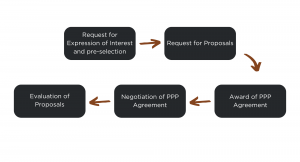Solicited Procurement of PPP Projects

In the previous article, we looked at the proposed process of identifying and approving PPP projects before inviting the private sector to bid on them under the PPP Bill. We address the proposed legal framework for solicited PPP projects in this article, as well as the key characteristics of the PPP Bill that both contracting authorities and bidders should be aware of, not least because solicited procurement is the most widely utilised mode of procurement.
The following are the major five phases of a solicited PPP project as contained in the PPP Bill:

Request for Expression of Interest (“EOI”) and Pre-Qualification
As a first step in interacting with prospective private sector developers, a contracting authority advertises and invites the private sector to bid on a project, for purposes of pre-selection. The EOI contains instructions for participation in the bidding process and a description of the essential elements of the proposed PPP project such as:
- the services or infrastructure to be provided by the concessionaire or private sector developer;
- the proposed financial structure of the PPP; and
- a summary of the material terms of the PPP agreement
The pre-selection bidding documents provide information on the selection criteria, as well as whether bidders can participate as consortiums. They also include requirements for:
- the bidder’s team’s professional and technical qualifications, human resources, equipment, and facilities required to complete a project; and
- management and organisational abilities, dependability, and experience of the bidder.
A bidder or consortium of bidders must meet the following requirements to be considered for pre-selection:
- meet the conditions outlined in the EOI;
- not be insolvent, in receivership, bankrupt, undertaking business rescue, or being wound up; or
- be permitted to participate in PPP projects.
A bidder will be rejected at the pre-selection stage if, in addition to failing to satisfy the aforementioned requirements, it is determined that they:
- submitted false, inaccurate or incomplete information;
- was involved in any corrupt or dishonest conduct intended to gain an advantage over other bidders;
- has contravened any law in order to gain an unfair advantage over other bidders.
Request for Proposals (“RfP”)
Successful pre-selected bidders are invited to submit bids for the PPP project through an RfP issued by a contracting authority. A contracting authority may issue an RfP in either a single stage or a two-stage approach.
Single stage procedure
A contracting authority issues an RfP with accompanying documentation, including a draft PPP agreement, to pre-selected bidders under the single stage approach. The pre-selected bidders are expected to complete and submit the required documentation referred to in the RfP.
Two-stage procedure – part one
A two-stage procedure is implemented where a contracting authority does not consider it appropriate or suitable to describe the project and the requirements of the project in an RfP, unlike in the case of the single stage procedure.
The first step of the two-stage method is a call for technical proposals, in which bidders submit preliminary proposals relating to project specifications, finance requirements, performance indicators, and other contractual parameters offered by the contracting authority.
The contracting authority then convenes a meeting or bid conference to clarify the first request for technical proposals and to examine any difficulties raised by the bidders’ initial technical proposals. The contracting authority then examines and updates the first technical RfP, based on the findings or outcome of the meeting with bidders.
Two-stage procedure – part two
Part two of the process involves a contracting authority issuing an RfP for bidders’ final technical proposals based on the revised set of project specifications, performance indicators, and contractual terms.
The PPP Bill notes that bidders in both single stage and two-stage procedures may want clarification on RfPs outside of the meeting or conference with bidders. The PPP Bill therefore allows a contracting authority to clarify, evaluate, or change any aspect of an RfP on its own initiative or at the request of a bidder.
Environmental considerations of RfP
According to the PPP Bill, an RfP should include information on the requirements for safety, security, and environmental protection. The inclusion of environmental protection criteria in the PPP Bill highlights the growing need for private sector developers to adopt and implement appropriate environmental and climate change sensitive policies in their operations, as this is a pre-qualification criterion to participate not only in PPPs, but also in other forms of collaborative partnerships, including, as an emerging trend, access to financing by certain financial institutions.
Evaluation and Ranking of Proposals
The PPP Bill expressly provides for the submission of technical proposals but is silent on when financial proposals may be submitted. It is assumed that instructions relating to the submission of financial proposals would be in the RfP, together with any other instructions relating to the bid.
Technical proposal evaluation criteria
The PPP Bill requires that the following factors be considered while evaluating technical proposals:
- technical adequacy;
- adherence to environmental regulations;
- operational feasibility;
- measures of continuity of the PPP project
Financial and commercial proposal evaluation criteria
The following financial and commercial evaluation factors are suggested for consideration:
- the proposed user fees and other charges for the duration of the PPP agreement. In the case of road or bridge PPP projects, this would relate to proposed tolls;
- when applicable, proposed direct payments by the contracting authority;
- the costs of design and building, as well as operation and project maintenance;
- the extent to which negotiated contractual conditions are accepted; and
- the proposal’s social and economic benefits.
Proposals are ranked based on the evaluation criteria and the relative weight assigned to each. The bidder with the highest ranking receives a “preferred bidder” status. The contracting authority submits an evaluation report of all rankings to the PPP Office which forwards the evaluation report to the PPP Technical Committee. The PPP Technical Committee makes a recommendation to the PPP Council, which either approves or rejects the evaluation report. When the PPP Council approves the evaluation report, it instructs the contracting authority to begin PPP discussions with the preferred bidder.
Negotiation and Award of PPP Agreement
Negotiation of PPP agreement
Negotiations for a PPP agreement between a contracting authority and a preferred bidder are limited to contractual terms that are not listed as non-negotiable in the RfP. The PPP Bill establishes a 90-day window for negotiations to take place. However, for reasonable grounds, a contracting authority may apply to the PPP Office for a time extension.
If a contracting authority believes that the negotiations are unlikely to succeed, it will notify the preferred bidder that the negotiations will be discontinued and provide the preferred bidder with a reasonable amount of time to make its best and final offer.
Should the preferred bidder’s best and final offer still be unacceptable, recommendations for termination of negotiations are made, and once such recommendations are approved by the PPP Council, the contracting authority invites other bidders, in order of ranking under the evaluation criteria, to negotiate the PPP agreement. The PPP Bill imposes a duty of confidentiality on any information provided during negotiations, regardless of whether they are successful or not.
Award and execution of PPP agreement
Upon successful completion of negotiations, a negotiations report is tendered to the PPP Council for approval. The report contains the financial model and a draft PPP agreement. The PPP Bill requires the PPP Council to approve, reject or defer the execution of the PPP agreement within 28 days of receipt of the negotiation report from the contracting authority. If approved, the preferred bidder must be notified of the approval of the PPP agreement within 7 days.
The contracting authority must submit the PPP agreement to the Attorney General for approval prior to execution. According to the PPP Bill, the Minister of Finance will also be a signatory to PPP agreements signed between contracting authorities and developers.
In the next article, we will look unsolicited proposals, and how the private sector may initiate the development of a PPP project.
To keep abreast with the regulatory reforms and legal matters, contact Brenda Mutale Chanda at brenda.chanda@moiramukuka.com or Mumbi Mulenga at mumbi.mulenga@moiramukuka.com